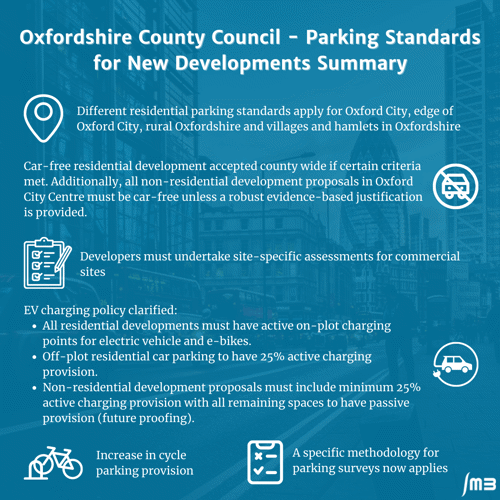Transport planning, like any industry, is subject to constant change and has to evolve in order to meet the shifting goals and needs of councils, communities, and society. The early signs of what could be a major change in the transport planning process has come in the form of a new approach being adopted by Oxfordshire County Council (OCC). This is summarised in a report titled “Implementing ‘Decide & Provide’: Requirements for Transport Assessments” (2022) and was approved by Cabinet in September 2022.
The report outlines the new approach OCC will be taking to transport planning and why they think this is the way to go. According to OCC, “transport planning practice has typically followed the ‘predict and provide’ approach, which can be broadly described as an approach to transport planning that uses current or historical traffic patterns to determine the future need for infrastructure. However, this approach tends to simply maintain the status quo by perpetuating dependence on the private car through provision of additional highway capacity.”
OCC put forward the idea of a ‘decide and provide’ approach which prioritises the central vision of an authority and then provides the means to achieve this. They argue that this will enable more positive transport planning and will help them achieve their goal of a reduction in reliance on the private car and an increase in uptake of the active (walking and cycling) and public transport modes.
This approach will be implemented through “transport assessments and infrastructure delivery mechanisms which accompany planning applications for proposed development.” The application of this strategy will mean that, if a junction is forecast to be over capacity, rather than increasing its capacity for private vehicles, developers will be expected to prioritise provision improvements for the active and public transport modes to alleviate pressure on the junction. OCC acknowledge that such a change will require a large-scale rethinking of spatial and transport planning from the strategic scale all the way through each stage of planning, but perhaps this shake-up will prove to be the necessary catalyst for progress.
How Will this Affect Transport Assessments and the Role of a Transport Planner?
In the case of OCC, this new approach will still require proposed developments to assess their impact on the highway network, however rather than focusing solely on the past, developers will have to model a range of plausible scenarios. “These plausible scenarios will need to be based on the characteristics of the proposed development site’s location, its existing connectivity, the mitigation or connectivity improvements that will be either delivered directly by the site developers or through financial contributions towards OCC schemes, and the extrapolation of historic trends.”
By undertaking this approach, every proposed development and especially large ones, could help contribute to the overall transport goals set out by a council. While this may initially present a challenge to transport planners who are accustomed to the prediction model, it could signal the beginning of an acceleration towards the meeting of ambitious net zero targets and other strategic transport goals.
Could other councils follow suit and adopt a ‘decide and provide’ approach? Is this the blueprint for a method that could help achieve the reduction in congestion and carbon emissions targeted in the London Plan (2021)? All of this is yet to be seen, but this approach is undeniably an interesting development in the world of transport planning.
New Parking Standards
To supplement this change of approach, the OCC cabinet have recently approved the adoption of new parking standards, something which should help facilitate the changes they envisage. These new parking standards include different levels of parking provision for residential developments in Oxford city, the edge of Oxford city and rural Oxfordshire, in order to meet the varying needs of each location. Additionally, car-free residential development will be accepted county-wide if certain criteria is met.
Cycle parking provision will be increased county wide and all residential developments will be required to provide active on-plot charging points for electric vehicles and e-bikes.
In terms of commercial sites, developers must undertake site-specific assessments to determine the level of car parking provision provided and all non-residential developments in Oxford city-centre must be car-free unless a robust, evidence-based justification is provided. Non-residential development proposals must also include a minimum of 25% active charging provision across all parking spaces, with all the remaining spaces to be served by passive charging provision, thus ‘future proofing’ the site.
All of this is intended to hasten Oxfordshire’s transition to a less car-dependent future and with proactive policies such as this, it becomes a more realistic goal by the day.

For further information or for Transport Planning services, please contact our friendly team to see how we can help.
References
https://mycouncil.oxfordshire.gov.uk/ieDecisionDetails.aspx?ID=9477







